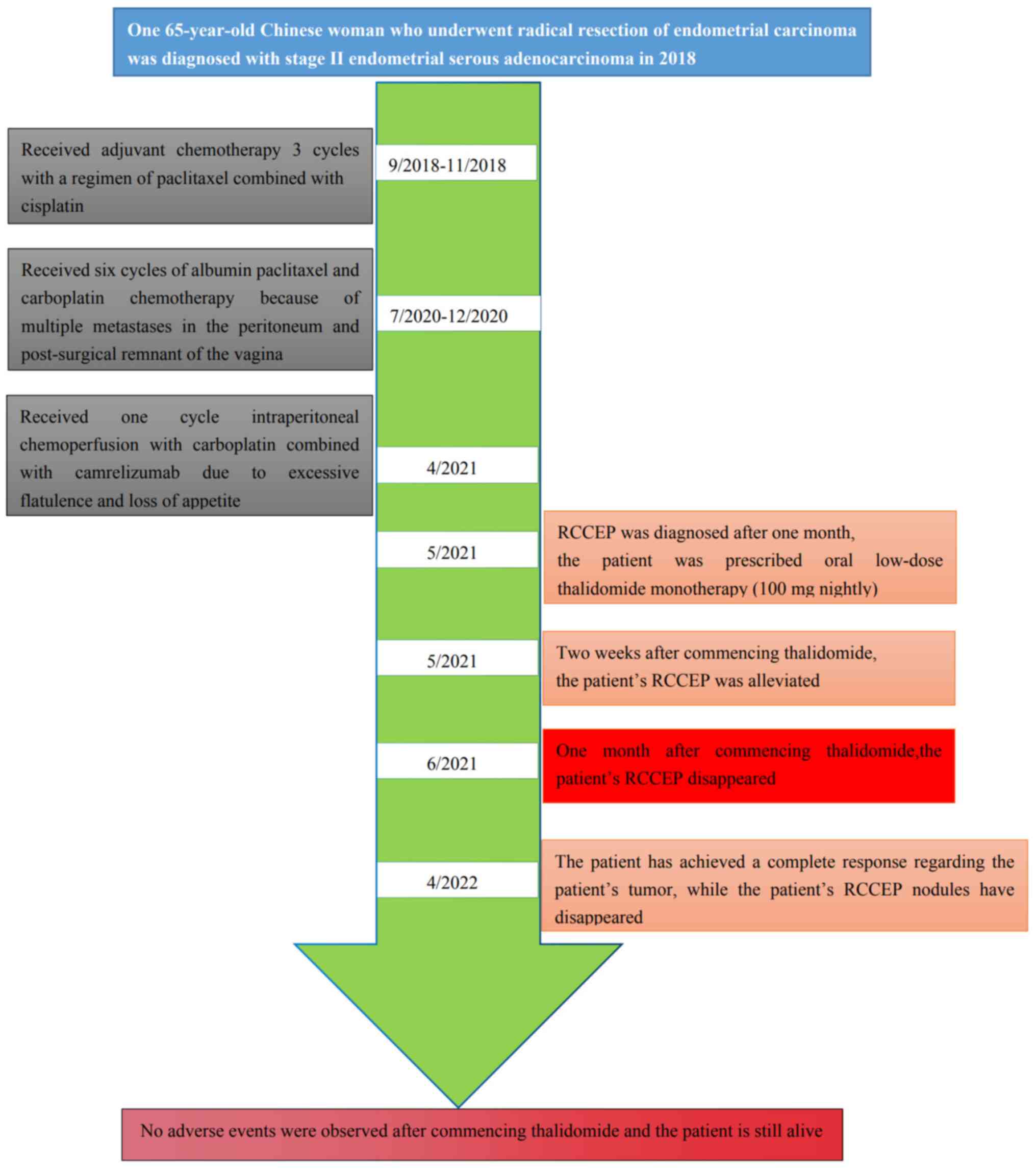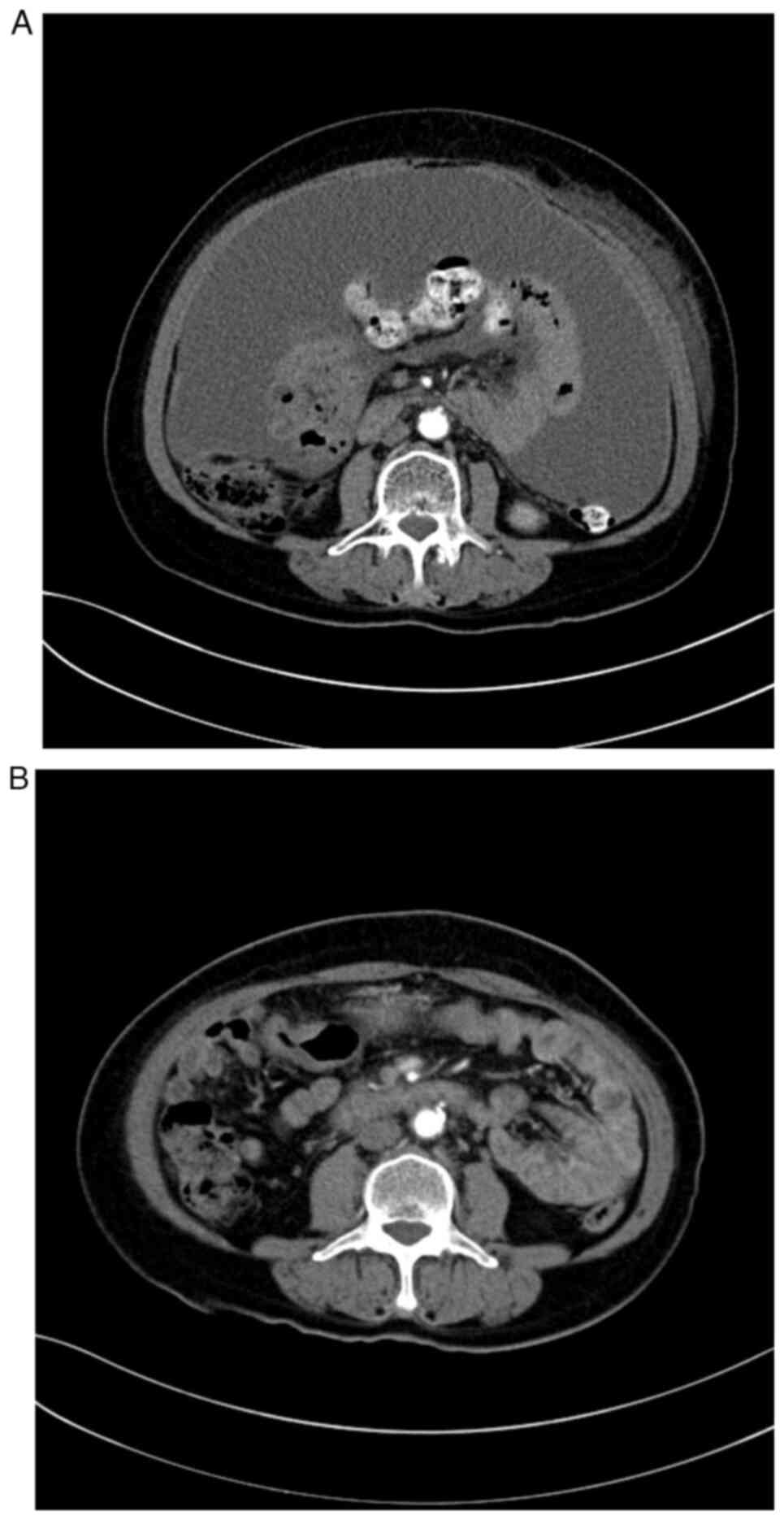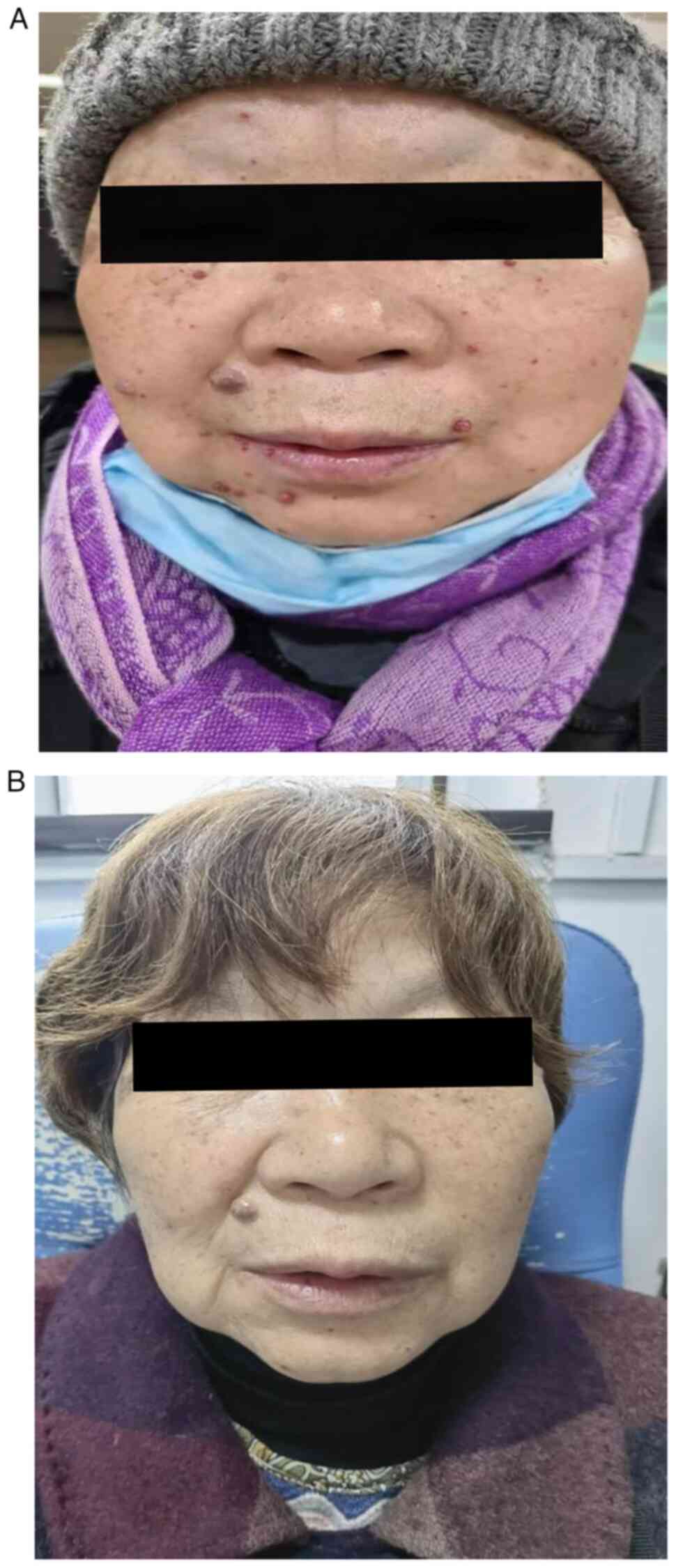|
1
|
Fang W, Yang Y, Ma Y, Hong S, Lin L, He X,
Xiong J, Li P, Zhao H, Huang Y, et al: Camrelizumab (SHR-1210)
alone or in combination with gemcitabine plus cisplatin for
nasopharyngeal carcinoma: Results from two single-arm, phase 1
trials. Lancet Oncol. 19:1338–1350. 2018.PubMed/NCBI View Article : Google Scholar
|
|
2
|
Mo H, Huang J, Xu J, Chen X, Wu D, Qu D,
Wang X, Lan B, Wang X, Xu J, et al: Safety, anti-tumour activity,
and pharmacokinetics of fixed-dose SHR-1210, an anti-PD-1 antibody
in advanced solid tumours: A dose-escalation, phase 1 study. Br J
Cancer. 119:538–545. 2018.PubMed/NCBI View Article : Google Scholar
|
|
3
|
Teng Y, Guo R, Sun J, Jiang Y and Liu Y:
Reactive capillary hemangiomas induced by camrelizumab (SHR-1210),
an anti-PD-1 agent. Acta Oncol. 58:388–389. 2019.PubMed/NCBI View Article : Google Scholar
|
|
4
|
Chen X, Ma L, Wang X, Mo H, Wu D, Lan B,
Qu D, Zhang H, Huang J and Xu BH: Reactive capillary hemangiomas: A
novel dermatologic toxicity following anti-PD-1 treatment with
SHR-1210. Cancer Biol Med. 16:173–181. 2019.PubMed/NCBI View Article : Google Scholar
|
|
5
|
Chinese Society of Clinical Oncology
(CSCO): Management of Immune Checkpoint Inhibitor-Related Toxicity,
1. People's Health Publishing House, Beijing, 2020.
|
|
6
|
Rispoli M, Savastano MC and Lumbroso B:
Quantitative vascular density changes in choriocapillaris around
CNV after anti-VEGF treatment: Dark halo. Ophthalmic Surg Lasers
Imaging Retina. 49:918–924. 2018.PubMed/NCBI View Article : Google Scholar
|
|
7
|
Vacca A, Scavelli C, Montefusco V, Di
Pietro G, Neri A, Mattioli M, Bicciato S, Nico B, Ribatti D,
Dammacco F and Corradini P: Thalidomide downregulates angiogenic
genes in bone marrow endothelial cells of patients with active
multiple myeloma. J Clin Oncol. 23:5334–5346. 2005.PubMed/NCBI View Article : Google Scholar
|
|
8
|
Keifer JA, Guttridge DC, Ashburner BP and
Baldwin AS Jr: Inhibition of NF-kappa B activity by thalidomide
through suppression of IkappaB kinase activity. J Biol Chem.
276:22382–22387. 2001.PubMed/NCBI View Article : Google Scholar
|
|
9
|
Melchert M and List A: The thalidomide
saga. Int J Biochem Cell Biol. 39:1489–1499. 2007.PubMed/NCBI View Article : Google Scholar
|
|
10
|
Raje N and Anderson KC: Thalidomide and
immunomodulatory drugs as cancer therapy. Curr Opin Oncol.
14:635–640. 2002.PubMed/NCBI View Article : Google Scholar
|
|
11
|
Yuan JH, Yang F, Wang F, Ma JZ, Guo YJ,
Tao QF, Liu F, Pan W, Wang TT, Zhou CC, et al: A long noncoding RNA
activated by TGF-β promotes the invasion-metastasis cascade in
hepatocellular carcinoma. Cancer Cell. 25:666–681. 2014.PubMed/NCBI View Article : Google Scholar
|
|
12
|
Song G, Zhang FF and Cheng HD: Thalidomide
for prevention of camrelizumab-induced reactive cutaneous capillary
endothelial proliferation. Australas J Dermatol. 63:217–221.
2022.PubMed/NCBI View Article : Google Scholar
|
|
13
|
Li Q, Zhou Y, He W, Ren X, Zhang M, Jiang
Y, Zhou Z and Luan Y: Platelet-armored nanoplatform to harmonize
janus-faced IFN-γ against tumor recurrence and metastasis. J
Control Release. 338:33–45. 2021.PubMed/NCBI View Article : Google Scholar
|
|
14
|
Zhang M, Qin X, Zhao Z, Du Q, Li Q, Jiang
Y and Luan Y: A self-amplifying nanodrug to manipulate the
Janus-faced nature of ferroptosis for tumor therapy. Nanoscale
Horiz. 7:198–210. 2022.PubMed/NCBI View Article : Google Scholar
|
|
15
|
Bhardwaj M, Chiu MN and Pilkhwal Sah S:
Adverse cutaneous toxicities by PD-1/PD-L1 immune checkpoint
inhibitors: Pathogenesis, treatment, and surveillance. Cutan Ocul
Toxicol. 41:73–90. 2022.PubMed/NCBI View Article : Google Scholar
|
|
16
|
Qin S, Ren Z, Meng Z, Chen Z, Chai X,
Xiong J, Bai Y, Yang L, Zhu H, Fang W, et al: Camrelizumab in
patients with previously treated advanced hepatocellular
carcinoma:A multicentre,open-label, parallel-group, randomised,
phase 2 trial. Lancet Oncol. 21:571–580. 2020.PubMed/NCBI View Article : Google Scholar
|
|
17
|
Mok TSK, Wu YL, Kudaba I, Kowalski DM, Cho
BC, Turna HZ, Castro G Jr, Srimuninnimit V, Laktionov KK,
Bondarenko I, et al: Pembrolizumab versus chemotherapy for
previously untreated, PD-L1-expressing, locally advanced or
metastatic non-small-cell lung cancer(KEYNOT-042):A randomised,
open-label, controlled, phase 3 trail. Lancet. 393:1819–1830.
2019.PubMed/NCBI View Article : Google Scholar
|
|
18
|
Si L, Zhang X, Shu Y, Pan H, Wu D, Liu J,
Lou F, Mao L, Wang X, Wen X, et al: A phase Ib study of
Pembrolizumab as second-line therapy for Chinese patients with
advanced or metastatic melanoma(KEYNOTE-151). Transl Oncol.
12:828–835. 2019.PubMed/NCBI View Article : Google Scholar
|
|
19
|
Song Y, Wu J, Chen X, Lin T, Cao J, Liu Y,
Zhao Y, Jin J, Huang H, Hu J, et al: A single-arm, multicenter,
phase II study of camrelizumab in relapsed or refractory classical
hodgkin lymphoma. Clin Cancer Res. 25:7363–7369. 2019.PubMed/NCBI View Article : Google Scholar
|
|
20
|
Wang F, Qin S, Sun X, Ren Z, Meng Z, Chen
Z, Chai X, Xiong J, Bai Y, Yang L, et al: Reactive cutaneous
capillary endothelial proliferation in advanced hepatocellular
carcinoma patients treated with camrelizumab:data derived from a
multicenter phase 2 trial. J Hematol Oncol. 13(47)2020.PubMed/NCBI View Article : Google Scholar
|
|
21
|
Yu Q and Wang WX: Camrelizumab (SHR-1210)
leading to reactive capillary hemangioma in the gingiva:A case
report. World J Clin Cases. 8:624–629. 2020.PubMed/NCBI View Article : Google Scholar
|
|
22
|
Qin SK and Wang F: Camrelizumab induced
cutaneous capillary endothelial proliferation Clinical expert
consensus. Chin Clin Oncol. 25:840–846. 2020.(In Chinese).
|
|
23
|
Huang J, Xu J, Chen Y, Zhuang W, Zhang Y,
Chen Z, Chen J, Zhang H, Niu Z, Fan Q, et al: Camrelizumab versus
investigator's choice of chemotherapy as second-line therapy for
advanced or metastatic oesophageal squamous cell carcinoma
(Escort):A multicentre, randomised, open-label, phase 3 study.
Lancet Oncol. 21:832–842. 2020.PubMed/NCBI View Article : Google Scholar
|
|
24
|
Aso M, Toi Y, Sugisaka J, Aiba T, Kawana
S, Saito R, Ogasawara T, Tsurumi K, Ono K, Shimizu H, et al:
Association between skin reaction and clinical benefit in patients
treated with anti-programmed cell death 1 monotherapy for advanced
non-small cell lung cancer. Oncologist. 25:e536–e544.
2022.PubMed/NCBI View Article : Google Scholar
|
|
25
|
Spratlin JL, Mulder KE and Mackey JR:
Ramucirumab (IMC-1121B):A novel attack on angiogenesis. Future
Oncol. 6:1085–1094. 2010.PubMed/NCBI View Article : Google Scholar
|
|
26
|
Lee SJ, Lee SY, Lee WS, Yoo JS, Sun JM,
Lee J, Park HS, Park JO, Ahn MJ, Lim HY, et al: Phase I trial and
pharmacokinetic study of tanibirumab, a fully human monoclonal
antibody to vascular endothelial growth factor receptor 2, in
patients with refractory solid tumors. Invest New Drugs.
35:782–790. 2017.PubMed/NCBI View Article : Google Scholar
|
|
27
|
Ton NC, Parker GJ, Jackson A, Mullamitha
S, Buonaccorsi GA, Roberts C, Watson Y, Davies K, Cheung S, Hope L,
et al: Phase I evaluation of CDP791, a pegylated di-Fab' conjugate
that binds vascular endothelial growth factor receptor2. Clin
Cancer Res. 13:7113–7118. 2007.PubMed/NCBI View Article : Google Scholar
|
|
28
|
Zhou C, Gao G, Wang YN, Zhao J, Chen G,
Liu Z, Gu K, Huang M, He J, Chen J, et al: Efficacy of PD-1
monoclonal antibody SHR-1210 plus Apatinib in patients with
advanced non-squamous NSCLC with wild-type EGFR and ALK. J Clin
Oncol. 35(9112)2019.
|
|
29
|
Salemi M, Mohammadi S, Ghavamzadeh A and
Nikbakht M: Anti-vascular endothelial growth factor targeting by
curcumin and thalidomide in acute myeloid leukemia cells. Asian Pac
J Cancer Prev. 18:3055–3061. 2017.PubMed/NCBI View Article : Google Scholar
|
|
30
|
Bodera P and Stankiewicz W:
Immunomodulatory Properties of Thalidomide Analogs: Pomalidomide
and lenalidomide, experimental and therapeutic applications. Recent
Pat Endocr Metab Immune Drug Discov. 5:192–196. 2011.PubMed/NCBI View Article : Google Scholar
|
|
31
|
Bai YZ, Wang Q, Guo BS, Wang Ax, Zhang LH,
Xue F, Li SY and Li YP: Effects of Thalidomide on the Expression of
Collagen IA1 and Regulatory Factor in Histamine-activated Human
Dermal Fibroblasts. Chin J Derm Venereol. 36:1253–1255. 2022.(In
Chinese).
|

















